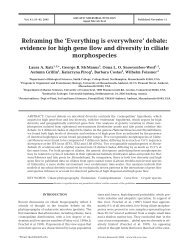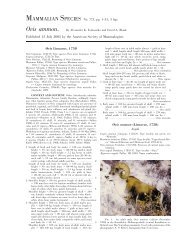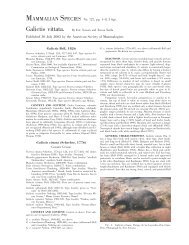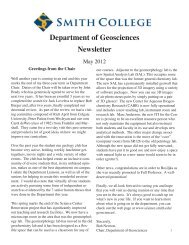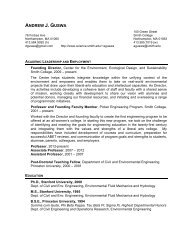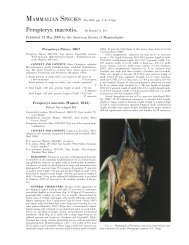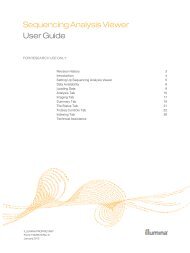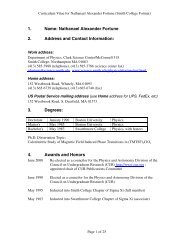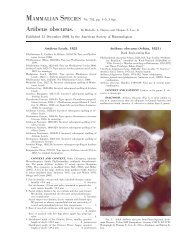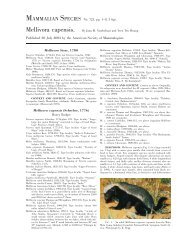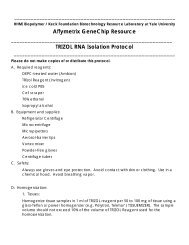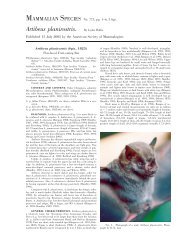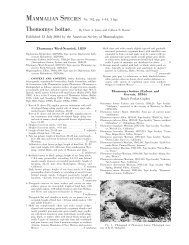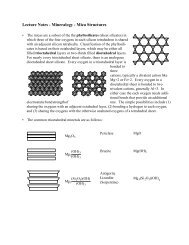Brugia Malayi - Clark Science Center - Smith College
Brugia Malayi - Clark Science Center - Smith College
Brugia Malayi - Clark Science Center - Smith College
Create successful ePaper yourself
Turn your PDF publications into a flip-book with our unique Google optimized e-Paper software.
Methyl Transfer of Oxygen Nucleophiles in Organic Synthesis<br />
Yuan Ji and Jessica Sweeney<br />
Methylation is widely used in organic chemistry to synthesize molecules including polymers and pharmaceuticals. Common<br />
substrates to synthesize are phenols, carboxylic acids, and aliphatic alcohols. The goal of our research is to find safer and costeffective<br />
reagents to perform methylation. Currently, the most common methods of methylation involve hazardous and highly<br />
toxic chemicals such as diazomethane. Diazomethane is explosive and must be synthesized using specialized glassware due to its<br />
instability. Exposure to current methylating agents has caused several deaths since 2008. 1<br />
In our research, we methylated benzoic acid and phenol using dimethyl carbonate as a safe-alternative to diazomethane.<br />
We ran over one-hundred reactions this summer to determine the best conditions. Most reactions were run on a 25 mg scale.<br />
Various bases were screened with equivalents ranging from 1 to 0.1. We also screened a range of catalysts, solvents, and varied the<br />
temperature and duration at which these reactions were run.<br />
Data obtained from screening were quantified using a gas chromatograph-mass spectrometer. By running samples containing<br />
known concentrations of our product along with an internal standard, we were able to construct standard curves that correlate GC<br />
signal integration with concentration of product.<br />
We established the best conditions for methylating benzoic acid were using catalytic amounts of potassium carbonate (0.2 eq.)<br />
at 90 o C for 72 hours. This reaction was run on a 100 mg scale. The product was isolated and an 81% yield was obtained. Another<br />
set of reactions were run using trimethyl orthoacetate in placement of dimethyl carbonate as the methylating agent.<br />
Similar to the methylation of benzoic acid with dimethyl carbonate, starting conditions for methylation with orthoacetate<br />
included a catalyst, methylating agent, and starting material. We have had success with catalytic amounts of metal halides at a<br />
temperature of 90 o C (73%). Lastly, methylation of phenol was also researched.<br />
Much like the benzoic acid methylation, various bases, catalysts, and solvents were screened. Thus far, the best conditions for<br />
methylation of phenol with dimethyl carbonate include catalytic amounts of 1,2-dimethylimidazole and extreme heat (~150 o C);<br />
these conditions gave a 74% yield. During the semester we hope to establish mild conditions for the methylation of benzoic<br />
acid with orthoacetate and the methylation of phenol by continuing to screen more catalysts, bases, and temperatures. After a<br />
successful ten weeks over 170 reactions were run and quantified. (Supported by the Howard Hughes Medical Institute)<br />
Advisor: David Gorin<br />
References:<br />
1.<br />
Shieh, W.-C.; Dell, S.; Repic, O. “Nucleophilic catalysis with 1,8-diazabicyclo[5.4.0]undec-7-ene (DBU) for the esterification of carboxylic acids with dimethyl<br />
carbonate.” Journal of Organic Chemistry 2002, 67, 2188-2191. b)Rekha, V. V.; Ramani, M. V.; Ratnamala, A.; Rupakalpana, V.; Subaraju, G. V.; Satyanarayana, C.; Rao,<br />
C. S. “A simple, efficient, green, cost effective and chemoselective process for the esterification of carboxylic acids.” Organic Process Research and Development<br />
2009, 13, 769-773. c) Carafa, M.; Mesto, E.; Quaranta, E. “DBU-Promoted Nucleophilic Activation of Carbonic Acid Diesters.” European Journal of Organic<br />
Chemistry 2011, 2458-2465.<br />
2012<br />
86



